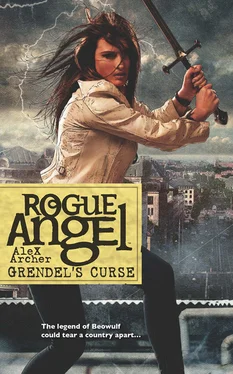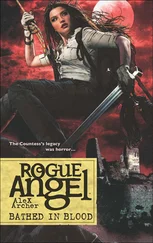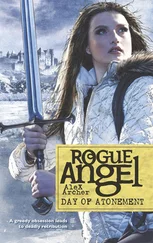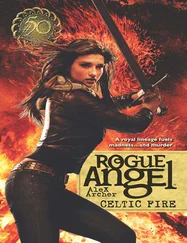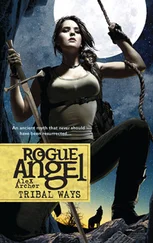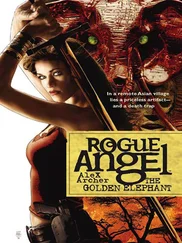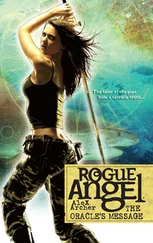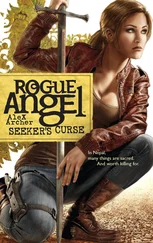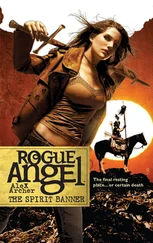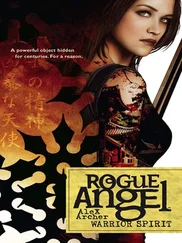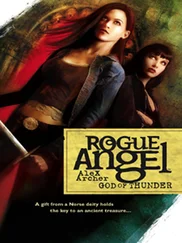It was time to seal the barrow.
Beowulf was dead.
1
Karl Thorssen took to the stage like a god. Not just any god, an angry Norse god of old, with flowing blond locks cascading down his back. The silver hammer of Thor was just visible beneath the V-neck of his shirt.
He was met by thunderous rapture.
The assembly didn’t just clap, they stamped their feet, they chanted, they yelled his name over and over and over until it rose into a mindless crescendo. There was something else in the chant, too, words she didn’t understand, as the room filled with noise. “Quite some welcome,” Annja Creed said to the man beside her.
Thorssen stopped center stage and held his arms aloft.
He closed his eyes, threw his head back and embraced the adoration.
It was more like a rock concert than a political rally, she thought, half expecting to see Queens of the Stone Age or Queensrÿche come striding out behind him. The room had that kind of vibe. Alone, each and every one of the people gathered in the theater might have been the nicest person in the world, but together like this the mob took on its own personality. It gave her the creeps. Annja had seen enough fanatical evangelists whip up this kind of fervor in the faithful to know it wasn’t exactly healthy outside of a sports arena, and even then that was more gladiatorial than devotional. The comparison was good, actually. There was something almost religious in this, too. Even his stance mimicked the familiar iconography of Jesus on the cross, suffering for our sins.
Only, Karl Thorssen wasn’t suffering in the slightest.
Here, in front of these people, he really was the god they were looking for. That was the only way of describing it.
On either side of the stage Annja marked two thickset men, both in matching dark suits, starched white shirts and pencil-thin black ties. They couldn’t have been more conspicuous. They were just another aspect of Thorssen’s carefully manufactured persona. SAPO—the Swedish Security Service—had officers in the hall, but they didn’t stick out like a sore thumb. Annja had made six of them in the crowd, watching, waiting. This pair waiting in the wings were purely for show. Thorssen wanted people to see them. He wanted people to know there had been threats on his life, but no amount of intimidation would stop him from standing up to be counted. That was the kind of man he was.
She’d only been in town for a couple of days and she already knew that much about him—and it wasn’t all down to her inherent distrust of politicians, either. The man was headline news. The tabloids loved him. The broadsheets loved to hate him. The people, she was quickly coming to realize, worshipped him. Even from down in the mosh pit she could feel the magnetic pull of his aura. The man radiated that magical X factor stars needed to really shine. A bit like Roux, really. That old rascal had a certain something. Right now, that something was probably a big pile of chips on the table in front of him, given that the last she’d heard from him he’d muscled into a high rollers’ tournament in Stockholm, part of the most popular poker tour. As for Garin, he’d no doubt found some expensive toys to buy, fast cars to race or faster women to chase. She hadn’t heard from him in over a month. That usually meant he was up to no good, but then, wasn’t he always?
One of the men nearest Annja was close enough for her to make out the edge of a tattoo of Thor’s hammer creeping out from beneath his collar. No doubt the room was filled with similar tattoos and necklaces. The hammer was a common enough branding for fascists in Sweden.
“What does the banner say?” Annja asked the man beside her. Micke Rehnfeldt was an old-school political journalist, the kind of guy not afraid to get his hands dirty if it meant getting to the truth. Thorssen was the current object of his affection. He was producing a television program about Thorssen and his proposed excavation of the Skalunda Barrow down in Årnäs. That was why Annja had made the trip to Gothenburg. How could she not? It wasn’t every day the burial mound of a legend was excavated, and that was exactly what Beowulf was. A legend. The Geatish king who had rid the land of demons and dragons in one of the oldest sagas of its type. So while he wasn’t a monster, he was still the perfect subject for a segment on Chasing History’s Monsters.
“Svensk Tiger Ryter? It means the ‘Swedish Tiger Roars,’” Micke said. “It’s a play on the old ‘En Svensk Tiger.’ You’ve heard that before, right? It’s like the ‘Loose Lips Sink Ships’ thing the Brits used to say. It’s from an old propaganda poster that warned Swedes to be wary of foreigners during the Second World War.” Annja didn’t see the link so Micke spelled it out for her. “See, tiger is, well, a tiger.” He mimed creeping about like a wild animal, and then grinned sheepishly. “Obviously, but in Swedish the verb tiga, which is the root of tiger, means to keep silent. So ‘En Svensk Tiger’ could mean either Swedish Tiger or Swede Keeps Silent.”
“Ah, clever. A line deeply rooted in the suspicion of foreigners. Class act.”
Micke nodded. “No kidding. Thorssen’s party is emerging as the major force in right-wing politics over here. I don’t know how aware you are of the situation in Europe, but he’s riding a wave of support that is washing across the continent.”
“I’ve heard bits and pieces, it’s hard not to.”
“It’s only natural. When the economy is in trouble and money is tight, people always blame the foreigners for coming in and taking either jobs or putting pressure on state services. It’s the easiest thing to do, blame the outsiders rather than face up to the bad decisions they’ve made along the way.”
“And I’m sure it doesn’t hurt that he looks like Adonis’s only slightly uglier little brother.”
“People will swallow anything a pretty face tells them,” Micke agreed.
Sociopolitical stuff wasn’t Annja’s field of expertise, but they seemed like a reasonable set of assumptions given everything she knew about human behavior.
“Anyway, interesting place for a first date,” she joked, grinning wryly.
“Hey, never let it be said I don’t know how to show a girl a good time,” Micke countered with a grin of his own. It was easy to like him. He had to raise his voice to be heard over the chanting. “Seriously, though,” he said, “Thorssen’s interested in Beowulf. He’s one of the driving forces behind the excavation of the mound. I can think of plenty of reasons why, but rather than just tell you, I thought it’d be better for you to see it firsthand—it’s always more impressive that way.”
Even with him half shouting Annja could barely hear him above the clamor of the audience. The front few rows had long since stopped applauding, she realized. While most of the room was filled with supporters and fanatics, the front three rows consisted of journalists representing the world’s press. She recognized a few faces from Prague, Hyderabad and Paris, but could not put a name to any of them.
“Welcome, my friends,” Thorssen began, his words easy, conversational. Annja was relieved to hear he was going to speak in English; her Swedish was limited to saying “thank you” and she’d only learned that a few hours ago. There was more applause. Thorssen gestured for quiet, and within a few seconds the theater was silent.
He had the crowd in the palm of his hand.
“This is the first day. This is a day of new beginnings. This is the day that we claim back our country. This is the day when the Swedish Tiger roars!” On cue the audience roared its approval.
Thorssen smiled.
Annja didn’t like the man’s smile; it was condescending and self-satisfied. It was the kind of smirk she felt compelled to wipe off a face.
Читать дальше
